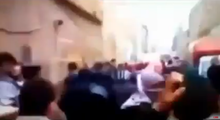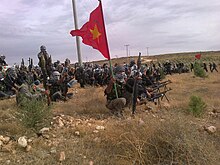Battle of al-Yaarubiyah
| Battle of al-Yaarubiyah | |||||||||
|---|---|---|---|---|---|---|---|---|---|
| Part of the al-Hasakah Governorate campaign (2012–13), the Syrian Kurdish–Islamist conflict (2013–present) and the inter-rebel conflict during the Syrian Civil War | |||||||||
 Map of the battle | |||||||||
| |||||||||
| Belligerents | |||||||||
|
Saladin al-Din Brigades[4] | ||||||||
| Commanders and leaders | |||||||||
| Unknown |
(Liwa al-Tawhid wal-Jihad commander) | ||||||||
| Casualties and losses | |||||||||
| 3 killed, many wounded (YPG claim)[3] |
6 killed (24 and 26 Oct., per SOHR)[8][9] Heavy (overall casualties per local reports)[10] 5 tanks captured[5] | ||||||||
Location within Syria | |||||||||
The Battle of al-Yaarubiyah was fought in late October 2013 at al-Yaarubiyah, a strategically important town at the border of Syria with Iraq. Affiliates of the Democratic Union Party (PYD), namely the YPG/YPJ and local Arab tribes, attacked the settlement in an attempt to capture it from Jihadist and Islamist groups, led by the Al-Nusra Front and the Islamic State of Iraq and the Levant. After four days of heavy fighting, the Islamists were defeated and expelled from al-Yaarubiyah.
Background
[edit]
The Syrian Civil War reached al-Yaarubiyah in early 2013, when a group of locals formed Ahrar al-Jazeera and started an uprising against the government. These local rebels were not very successful until they were reinforced by the al-Nusra Front, Ahrar al-Sham, and Ghuraba al-Sham, who captured al-Yaarubiyah in March 2013. Soon thereafter the insurgents began to fight each other over control of the town. The rebels in al-Yaarubiyah only banded together again in July, as the conflict between Islamists and pro-PYD factions in the al-Hasakah Governorate escalated. From then on, Islamist forces used the town as important staging point for attacks against YPG-held areas.[2] The YPG launched a general counter-offensive, code-named "Martyr Çekjin Efrin Revolutionary Operation", in early September, in course of which it captured several villages near al-Yaarubiyah.[11][12][13]
As the rebels in al-Yaarubiyah were forced on the defensive, Ahrar al-Jazeera fell out of favor with the other rebel groups, and was forcibly expelled from the town on charges that it was corrupt.[14][2] As result, al-Yaarubiyah was left under the control of four Jihadi groups by October 2013: The al-Nusra Front, the Islamic State of Iraq and the Levant,[b] Ansar al-Khilafa,[a] and Liwa al-Tawhid wal-Jihad. Both Ansar al-Khilafa and Liwa al-Tawhid wal-Jihad consisted of local Islamists, though they were much weaker than ISIL/al-Nusra.[14] In addition, Sky News Arabia reported that some Ahrar al-Sham fighters operated in the town.[16] The Jihadist rule of al-Yaarubiyah was harsh, as locals were forbidden from listening to music and forced to fast and pray, while dissidents were either imprisoned or beheaded. Food prices increased and fuel became scarce.[17] In response to these policies and the fighting in the area, most of the town's population fled to YPG territories.[2][17] Eventually, a delegation of 90 leading tribesmen from al-Yaarubiyah asked the YPG to drive the rebels from the town, to which the militia responded positively.[2]
Battle
[edit]
The YPG and YPJ launched the offensive to conquer al-Yaarubiyah on 23 October, beginning with the "Tırbespiyê" and "Til Elo Martyrs" operations, which aimed at securing the countryside around the town.[5] By the next day, the Kurds and forces of the Shammar tribe,[1] which were supported by local guides,[2] had captured four villages and three hamlets surrounding al-Yaarubiyah.[18]
In the night of 25 October, the Kurdish militias finally began their three-pronged assault on the town's outskirts, first seizing two strategic villages. The local cement plant, which had served as rebel headquarters, was captured by YPG/YPJ forces during a second assault in the early hours of the next day, while the town's border crossing and another village fell to the Kurdish units around dawn.[10] The YPG and YPJ then began their attack on al-Yaarubiyah itself, and in course of two days drove the Islamists from the town.[3][5][10][14] The last pockets of resistance consisting of ISIL, al-Nusra Front, and Ahrar al-Sham holdouts were cleared out on 27 October.[16] The YPG subsequently claimed that they had inflicted heavy casualties on the Islamists and captured five tanks, as well as large amounts of weapons and ammunition.[5][14]
After the town's fall, the Syrian rebels[3] as well as the National Iraqi Alliance[16] accused the Iraqi Army of having directly intervened in the battle on the side of the YPG/YPJ.[3] There were also claims about strikes on the town by the Iraqi Air Force.[16] Iraqi authorities strongly denied that any intervention had taken place,[3] with expert Aymenn Jawad Al-Tamimi saying that there was "no evidence of active Iraqi military aid to the YPG". Instead, the Iraqi Army had simply reinforced their side of the border during the battle in an attempt to prevent ISIL fighters from retreating into Nineveh Governorate.[14] Iraqi officials admitted, however, that wounded YPG fighters had received medical aid from the Iraqi Army.[3]
Aftermath and reactions
[edit]The capture of al-Yaarubiyah was hailed as great success by the PYD, but was also welcomed by the Kurdish National Council, a local political opponent of the PYD. Similarly, Syrian pro-government media reported the defeat of the Islamist rebel forces at al-Yaarubiyah with satisfaction.[14][3] The Syrian National Coalition, however, another Syrian opposition group and rival of the PYD, condemned the YPG for expelling the "Free Syrian Army" from the town, even though no FSA forces had been present during the battle.[14][19] In contrast, the Ahrar al-Jazeera Brigade took an intermediate stance, and officially denounced the purported Iraqi invasion of al-Yaarubiyah, while at the same time trying to negotiate a power-sharing deal with the YPG.[14]
Meanwhile, the YPG continued to advance in the countryside around al-Yaarubiyah and al-Jawadiyah, and between 28 and 29 October managed to encircle the elements of Liwa al-Tawhid wal-Jihad that had survived the battle at the town. As a result, much of the militia surrendered with their weapons and equipment, including its commander Abdul Hafez al-Jaryan, even though it had declared shortly before that it would fight together with ISIL against the YPG until the very end.[7] Some Liwa al-Tawhid wal-Jihad fighters remained active, however, and joined a counter-attack by the al-Nusra Front, ISIL, and Ansar al-Khilafa in early November, which aimed at retaking al-Yaarubiyah. Although the Jihadists, supported by Ahrar al-Sham, managed to advance into the town's outskirts,[14] the attack ultimately failed. In the following weeks al-Yaarubiyah was rebuilt, and on 22 November 2013 many of its civilian residents returned.[17] Opposition activists claimed, however, that thousands of other local Arabs had fled from the region rather than stay under PYD rule.[16]
For his role in handing over weapons to the YPG after surrendering, the Liwa al-Tawhid wal-Jihad commander al-Jaryan was later killed by ISIL in early January 2014 near the town of Tell Hamis, which saw a successful ISIL counter-offensive against the YPG at the beginning of that month.[6]
Notes
[edit]- ^ a b This "Ansar al-Khilafa" was a unit of locals from al-Yaarubiyah who were loyal to ISIL. It should not be confused with Ansar al-Khilafah, an Aleppo-based rebel group that also fought in al-Hasakah Governorate during this time.[15]
- ^ The relationship between ISIL and the al-Nusra Front in al-Yaarubiyah at the time was unclear, and it is possible that the two groups effectively operated as one in the town.[14]
References
[edit]- ^ a b Wladimir van Wilgenburg (31 July 2014). "Syrian Kurds appoint Arab governor in Hasakah, bid for international support". Middle East Eye. Retrieved 8 April 2017.
- ^ a b c d e f Carl Drott (15 May 2014). "Arab Tribes Split Between Kurds And Jihadists". Carnegie Middle East Center. Retrieved 8 April 2017.
- ^ a b c d e f g h i Khaled Yacoub Oweis (27 October 2013). "Kurdish militants tighten grip on Syria's northeast". Reuters. Retrieved 6 April 2017.
- ^ a b c "The Rebel Brigades deny the control of the "Kurdistan" on the "Al Yaroubiya" crossing in Hasakah". El-Dorar al-Shamia. 26 October 2013.
- ^ a b c d e "YPG takes control of Til Kocher". PUK Media. 27 October 2013. Archived from the original on 29 June 2018. Retrieved 6 April 2017.
- ^ a b ""داعش" تصفي قائد لواء التوحيد والجهاد [ISIS eliminates the commander of the Tawhid and Jihad Brigade]". Syria the Promise. 24 January 2014. Archived from the original on 31 January 2014.
- ^ a b "مقاتلون أكراد يحرزون تقدما على حساب مقاتلي معارضة وجهاديين في شمال شرق سوريا [Kurdish fighters make progress at the expense of opposition fighters and jihadists in northeastern Syria]". France 24. 29 October 2013. Archived from the original on 1 August 2022. Retrieved 1 August 2022.
- ^ "Clashes between rebel fighters and the YPG in Deir Ezoor". Syrian Observatory of Human Rights. 25 October 2013. Retrieved 11 February 2018.
- ^ "Saturday 26 October 2013". SKS.com.
- ^ a b c Namik Durukan (30 October 2013). "Syrian Kurdish Group Captures Key Iraq Crossing". al-Monitor. Archived from the original on 12 February 2018. Retrieved 29 June 2018.
- ^ "YPG launches "Martyr Çekjin Efrin Revolutionary Operation"". ANF News. 4 September 2013. Retrieved 6 April 2017.
- ^ "YPG rescues 20 villages in Girkê Legê since July". ANF News. 6 September 2013. Retrieved 6 April 2017.
- ^ "Fighting continues between YPG and al Nusra Front". PUK Media. 9 September 2013. Archived from the original on 13 February 2018. Retrieved 6 April 2017.
- ^ a b c d e f g h i j Aymenn Jawad Al-Tamimi; Fadel al-Kifa'ee (5 November 2013). "The Fall of Yaroubiya to the YPG In Context". Retrieved 6 April 2017.
- ^ Aymenn Jawad Al-Tamimi; Brown Moses (10 December 2013). "The Qamishli Front".
This Ansar al-Khilafa of the ruling coalition of Yaroubiya- described as 'ansar' (i.e. affiliates) of ISIS by a local pro-ISIS Hasakah contact- is independent from the Ansar al-Khilafa brigade affiliated with Hizb-ut-Tahrir in the western Aleppo countryside.
- ^ a b c d e "سوريا.. الأكراد يسيطرون على "اليعربية"" [Syria .. Kurds control "al-Yaarubiyah"]. Sky News Arabia. 27 October 2013. Retrieved 25 July 2019.
- ^ a b c Mike Giglio (27 November 2013). "Inside Syria: Al-Qaeda Was Here". BuzzFeed. Retrieved 6 April 2017.
- ^ "YPG rescues four villages in Til Koçer". PUK Media. 24 October 2013. Archived from the original on 14 February 2018. Retrieved 6 April 2017.
- ^ "Iraqi Soldiers and PYD Militiamen Attack FSA Brigades near Border with Iraq". Syrian National Coalition. 27 October 2013. Archived from the original on 10 November 2013. Retrieved 11 May 2017.
- Military operations of the Syrian civil war in 2013
- Military operations of the Syrian civil war involving the al-Nusra Front
- Military operations of the Syrian civil war involving the People's Protection Units
- Military operations of the Syrian civil war involving the Islamic State of Iraq and the Levant
- Battles of the Syrian civil war
- Conflicts in 2013

